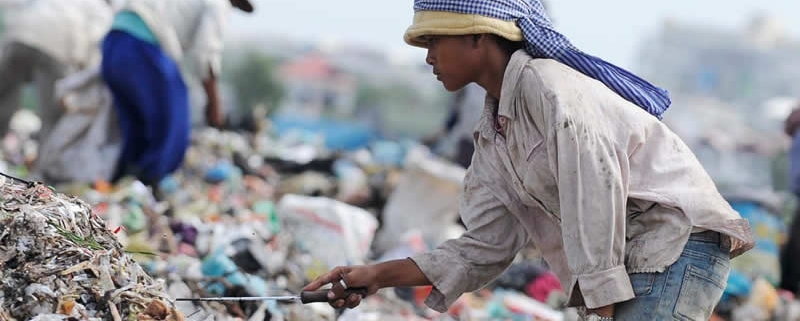
For 36-year-old Prince Friday the world, indeed, is not a bed of roses. The death of his parents prescribed untold hardship to Prince Friday Beaming and his siblings, but providence was later to take care of him. And, indeed, luck smiled on him recently when Pzafaama Helping Hand Foundation (PHHF) located him in an unhealthy dustbin environment in Asaba, Delta State (South South Nigeria), bringing unprecedented succor to him and his sick wife Mrs Blessing Ayulo.
Born in rural Igala, Kogi State, Friday was only 15 when his parents, both illiterate farmers, died. He was lived in an open space close to a garbage dump by the cow market section of the newly created Oko Market in the suburb of Asaba, Delta State capital, an oil producing area in the Niger Delta, Nigeria, where he scavenged for food and clothes. Daytimes, he sifted for plastics, aluminium and irons. He had leaved in the refuse dump for years with help cometh from nowhere.
At first sight, it was strange to see a man and a woman sleeping in a 3fts shackled made of old tadpole near a garbage bin. At second thought, they are lunatics, but of course, they are not. Friday is an example of the potential buried even in humanity’s most hopeless haunts, and a sobering reminder of how seldom it is mined. Over the years he was smoldering in trash heap that was his home.
Moved by compassion, to indicate that police is a unique endeavor to serve God and humanity, which shows there are few undertakings so noble as the protection of lives and properties, the benefactor of the Foundation, SP. (Dr. Ambr) Usman Dimka, offered to take them to a safe place. Subsequently, drew the attention of the Foundation to the pathetic living condition of the couple and swiftly, the Foundation rented and furnished a two bedroom apartment for Friday and his wife and gave him huge cash to start-up business.
Pzafaama Helping Hand Foundation (PHHF) visited the lonely and filthy dumpsite, the starved Friday stayed put, and when asked for interview, he obliged with good command of English language. Though he is a school dropout, but he hopes at advancing his education in Mass Communication.
At first sight of him, one may absolutely not be wrong to say he is a lunatic because he leaves in a sprawling garbage dump that was home to hundreds of herds of pigs. The dirty murky waters around the dumpsite is completely a breeding ponds for mosquitos, the insects that cause malaria which kills 10,000 people across African daily, according to World Health Organisation.
“I lived here, slept there, worked there. I built a place where I lived (pointing at 3fts shackled made of old tadpole. Mad people and domestic animals, all live together at the dumpsite.
“My brother, sometimes I go out to look for food, and then would come back without it. There were times I don’t eat the whole day,” he said.
He learned to spot trucks from hotels and bakeries that carried the tastiest castoffs, and to leap atop them to grab his share before they discharged their loads. For days when there was nothing to eat, he hoarded food in discarded cooking-oil tins, sunk into trash-fire embers to keep their contents warm.
He recalled with nostalgia how nearly he was buried alive by a bulldozer pushing mounds of garbage into a pit.
On how much he makes daily, he said, “I did not make money because over a thousand people would be struggling for just a piece of an item. At times, in a whole day, one could make N1,000 or thereabout.”
According to him, “it was not my wish to live at the dumpsite, but that was where life challenges pressed me to. I pick wastes, buyers buy from us, sell to other buyers. At early age, I lost my parents. My siblings and I were left on our own and life became nasty, brutish. My thoughts and memories lingered around criminality because of the fear of the unknown. But I would wave such thoughts aside telling myself that any hidden thing is not worth doing. I remember how my dad would provide for us and go through our books each day when the going was good.
“While still leaving on the streets, instead of indulging into crime, I resorted to scavenging of metals, irons, slippers, nylon and plastics. I was able to pull resources together and rented a room apartment but the building was demolished. Most tenants lost their properties including mine. I used my hand to build shanty close to Oko, and when the area was turned to market, the shanty was demolished. I came back to dump site because I lost everything and I have no money to rent another apartment in a better place,” he told the Foundation.
He said he was confronted with the fear of the unknown. “People have lived on the dump and became mad. People on the dumpsite were faced with the challenge of self-defeat and their only source of survival would be drugs and Indian hemp. If I was not strong-willed, I could not have lived and survived there because we lived in a negative world which dominates the thought. I was not easily influenced by the lifestyle in dumpsite, I never smoked Indian hemp or joined my mates to go for women of easy virtues. With my experience on the dumpsite, I advise parents to support and train their children. Family challenges brought most people to the dumpsite.”

